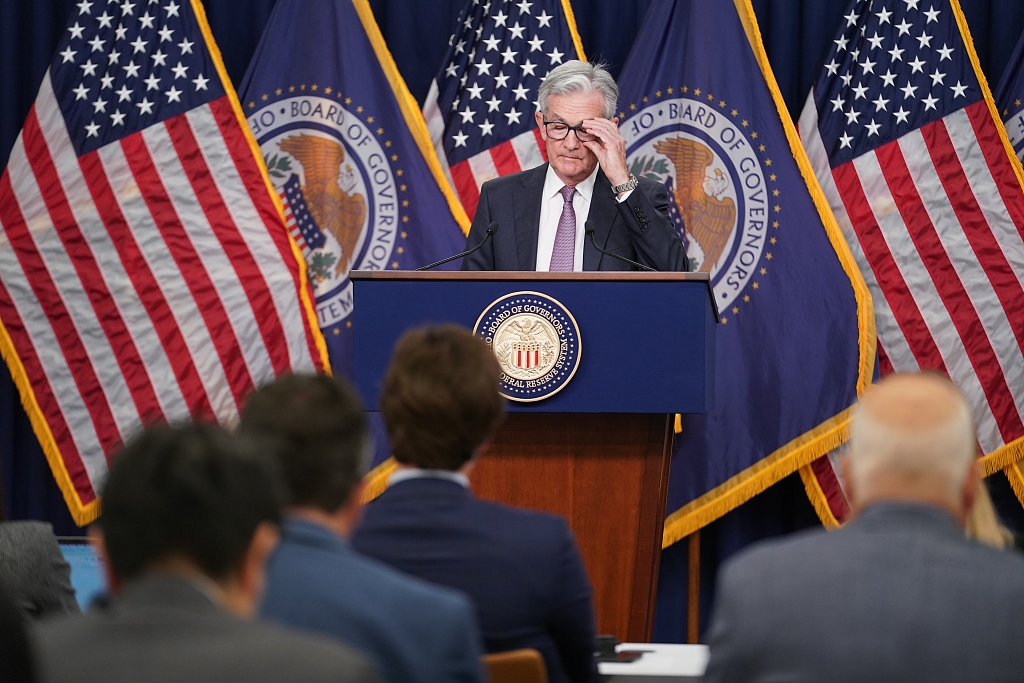
Pedestrians in Times Square near the Nasdaq Market Site in New York, U.S., February 3, 2022. /CFP
Pedestrians in Times Square near the Nasdaq Market Site in New York, U.S., February 3, 2022. /CFP
Editor's note: James DeShaw Rae is a professor of politics and the director of the Asian Studies Program at California State University, Sacramento. The article reflects the author's opinion, and not necessarily the views of CGTN.
On September 26, the Organization for Economic Cooperation and Development (OECD) and its chief economist Alvaro Pereira released its latest Interim Economic Outlook, including projections for the G20 and world economy; and as expected, it offered dismal prospects for the near-term.
Indeed, the title of the report, "Paying the Price of War," tells us all we need to know. The report offered four main takeaways: the world economy is slowing more than anticipated, inflation has become more widespread, inflation will ease but remain at high levels, and demand reduction and supply diversification are needed to avoid energy shortages.
One thing we learn, despite a period of near economic isolation, the global economy remains global, despite the disrupted supply changes of the past several years during the pandemic. Thus, virtually every country and region is negatively impacted by these trends.
Growth forecasts have all been cut since June, with Asia faring a bit better than Europe in expectations. The real GDP growth projection for the G20 in 2023 is slashed to 2.2 percent, down from 2.8 percent in 2022, while the twin engines of China and the United States manage only estimates of 4.7 percent and 0.5 percent respectively in 2023. Europe is largely flat-lined, with Germany expected to dip into negative growth next year and Russia is expected to see the worst, contracting around 5 percent. Meanwhile, inflation remains elevated, and will likely stay quite high in the energy sector owing to the protracted situation between Ukraine and Russia.
In the developed world, central bankers are uniformly raising interest rates and that will start to slow down economic activity, in a strategy designed to suffer through a temporary recession to tame runaway inflation. Public anxiety is rising, and political movements are challenging established political parties across Europe and North America. Economic downturns are very disruptive. In developing countries, those challenges are greater, and such countries will have to move quickly to avoid contagion.

Jerome Powell, chairman of the U.S. Federal Reserve, speaks during a news conference following a Federal Open Market Committee meeting in Washington, D.C., U.S., September 21, 2022. /CFP
Jerome Powell, chairman of the U.S. Federal Reserve, speaks during a news conference following a Federal Open Market Committee meeting in Washington, D.C., U.S., September 21, 2022. /CFP
For developing countries, slow growth of only a few percent cannot sustain the need for job creation and macroeconomic stability. For some energy-rich countries, the near-term outlook is more promising with energy and raw materials rising in cost, thus creating a renewed energy stream. Saudi Arabia and Indonesia are expected to have the most robust growth due to that reality. Yet the OECD recommends cutting demand due to inflation, but that will inevitably push many countries into recession and social safety nets have many holes and lack the ability to inject liquidity from government coffers.
Hopefully, as pandemic policies unwind, we will see greater economic output and a further return to flexible and smooth global supply chains and trade expansion. A resolution to the Russia-Ukraine war would be beneficial, though its regional impact is more centered on European energy prices and probably should not be the title of the whole report.
Trade tensions emanating from the United States toward China, the legacy of the Donald Trump tariffs and trade disruptions globally launched almost in tandem with the pandemic slowdown, along with supply chain interruptions are larger factors.
Of course, the OECD is encouraging reasonable recommendations such as tightening monetary policy to slow inflation, limiting stimulus support to protect vulnerable populations, and reducing energy demand and transition toward energy sustainability. Those solutions are still rather limited and ignore the diplomatic importance of reaching accommodation, not so much between Russia and Ukraine (which is nonetheless welcomed), but between China and the United States.
We are in an extraordinary challenging moment for a confluence of factors affecting the world's largest economies, but these problems are all manageable. Re-establishing trade norms of non-discrimination and reciprocal and mutually beneficial outcomes between the two largest economies is essential.
Jointly and cooperatively, through investment, concerted and harmonized fiscal and monetary policies, and free and open trade ties, China and the United States can stimulate production and growth and help lift the world out of the looming recession. Assuming relations between the two languish or continue to degrade, it may offset the economic meaning of peace in the Donbas region, if at all possible.
These are still political challenges as much as they are economic problems, and the shared dilemmas from the inflation-recession pivot manifest the need to rebuild the idea of economic cooperation among the two largest and most important economies, and this will do the most to help the G20, and the developing world, to achieve manageable inflation and sustained growth.
(If you want to contribute and have specific expertise, please contact us at opinions@cgtn.com. Follow @thouse_opinions on Twitter to discover the latest commentaries on CGTN Opinion Section.)

